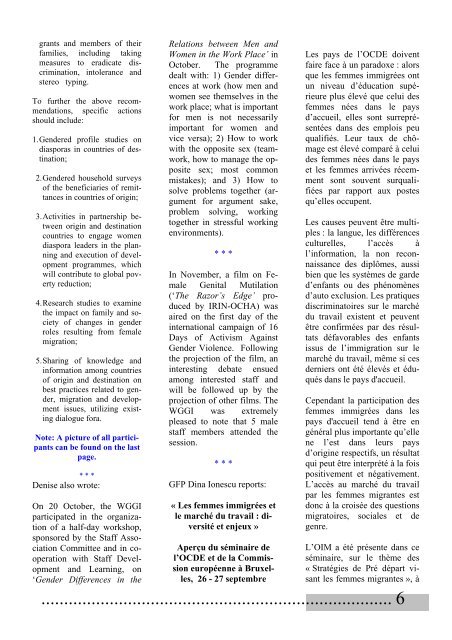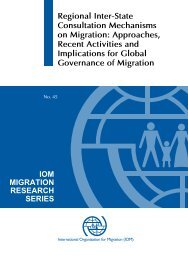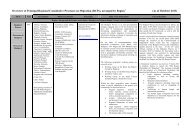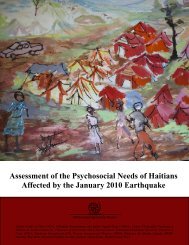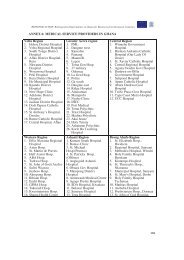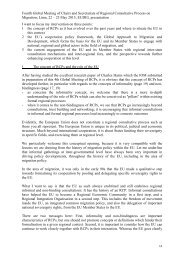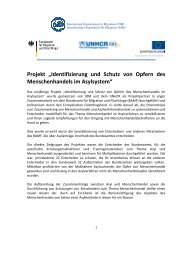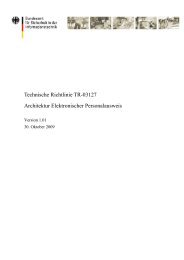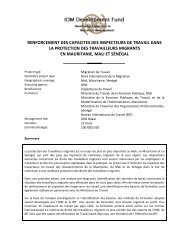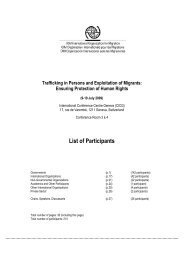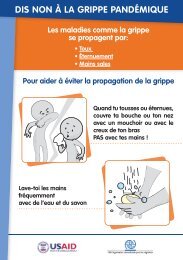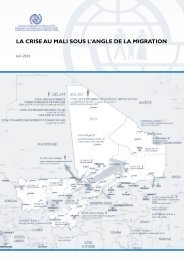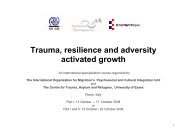iom gender and migration news - International Organization for ...
iom gender and migration news - International Organization for ...
iom gender and migration news - International Organization for ...
Create successful ePaper yourself
Turn your PDF publications into a flip-book with our unique Google optimized e-Paper software.
grants <strong>and</strong> members of their<br />
families, including taking<br />
measures to eradicate discrimination,<br />
intolerance <strong>and</strong><br />
stereo typing.<br />
To further the above recommendations,<br />
specific actions<br />
should include:<br />
1. Gendered profile studies on<br />
diasporas in countries of destination;<br />
2. Gendered household surveys<br />
of the beneficiaries of remittances<br />
in countries of origin;<br />
3. Activities in partnership between<br />
origin <strong>and</strong> destination<br />
countries to engage women<br />
diaspora leaders in the planning<br />
<strong>and</strong> execution of development<br />
programmes, which<br />
will contribute to global poverty<br />
reduction;<br />
4. Research studies to examine<br />
the impact on family <strong>and</strong> society<br />
of changes in <strong>gender</strong><br />
roles resulting from female<br />
<strong>migration</strong>;<br />
5. Sharing of knowledge <strong>and</strong><br />
in<strong>for</strong>mation among countries<br />
of origin <strong>and</strong> destination on<br />
best practices related to <strong>gender</strong>,<br />
<strong>migration</strong> <strong>and</strong> development<br />
issues, utilizing existing<br />
dialogue <strong>for</strong>a.<br />
Note: A picture of all participants<br />
can be found on the last<br />
page.<br />
* * *<br />
Denise also wrote:<br />
On 20 October, the WGGI<br />
participated in the organization<br />
of a half-day workshop,<br />
sponsored by the Staff Association<br />
Committee <strong>and</strong> in cooperation<br />
with Staff Development<br />
<strong>and</strong> Learning, on<br />
‘Gender Differences in the<br />
Relations between Men <strong>and</strong><br />
Women in the Work Place’ in<br />
October. The programme<br />
dealt with: 1) Gender differences<br />
at work (how men <strong>and</strong><br />
women see themselves in the<br />
work place; what is important<br />
<strong>for</strong> men is not necessarily<br />
important <strong>for</strong> women <strong>and</strong><br />
vice versa); 2) How to work<br />
with the opposite sex (teamwork,<br />
how to manage the opposite<br />
sex; most common<br />
mistakes); <strong>and</strong> 3) How to<br />
solve problems together (argument<br />
<strong>for</strong> argument sake,<br />
problem solving, working<br />
together in stressful working<br />
environments).<br />
* * *<br />
In November, a film on Female<br />
Genital Mutilation<br />
(‘The Razor’s Edge’ produced<br />
by IRIN-OCHA) was<br />
aired on the first day of the<br />
international campaign of 16<br />
Days of Activism Against<br />
Gender Violence. Following<br />
the projection of the film, an<br />
interesting debate ensued<br />
among interested staff <strong>and</strong><br />
will be followed up by the<br />
projection of other films. The<br />
WGGI was extremely<br />
pleased to note that 5 male<br />
staff members attended the<br />
session.<br />
* * *<br />
GFP Dina Ionescu reports:<br />
« Les femmes immigrées et<br />
le marché du travail : diversité<br />
et enjeux »<br />
Aperçu du séminaire de<br />
l’OCDE et de la Commission<br />
européenne à Bruxelles,<br />
26 - 27 septembre<br />
Les pays de l’OCDE doivent<br />
faire face à un paradoxe : alors<br />
que les femmes immigrées ont<br />
un niveau d’éducation supérieure<br />
plus élevé que celui des<br />
femmes nées dans le pays<br />
d’accueil, elles sont surreprésentées<br />
dans des emplois peu<br />
qualifiés. Leur taux de chômage<br />
est élevé comparé à celui<br />
des femmes nées dans le pays<br />
et les femmes arrivées récemment<br />
sont souvent surqualifiées<br />
par rapport aux postes<br />
qu’elles occupent.<br />
Les causes peuvent être multiples<br />
: la langue, les différences<br />
culturelles, l’accès à<br />
l’in<strong>for</strong>mation, la non reconnaissance<br />
des diplômes, aussi<br />
bien que les systèmes de garde<br />
d’enfants ou des phénomènes<br />
d’auto exclusion. Les pratiques<br />
discriminatoires sur le marché<br />
du travail existent et peuvent<br />
être confirmées par des résultats<br />
défavorables des enfants<br />
issus de l’im<strong>migration</strong> sur le<br />
marché du travail, même si ces<br />
derniers ont été élevés et éduqués<br />
dans le pays d'accueil.<br />
Cependant la participation des<br />
femmes immigrées dans les<br />
pays d'accueil tend à être en<br />
général plus importante qu’elle<br />
ne l’est dans leurs pays<br />
d’origine respectifs, un résultat<br />
qui peut être interprété à la fois<br />
positivement et négativement.<br />
L’accès au marché du travail<br />
par les femmes migrantes est<br />
donc à la croisée des questions<br />
migratoires, sociales et de<br />
genre.<br />
L’OIM a été présente dans ce<br />
séminaire, sur le thème des<br />
« Stratégies de Pré départ visant<br />
les femmes migrantes », à<br />
............................................................................. 6


